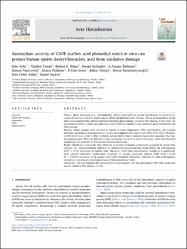| dc.contributor.author | Ayla, Şule | |
| dc.contributor.author | Tunalı, Gülden | |
| dc.contributor.author | Bilgiç, Bülent Emre | |
| dc.contributor.author | Sofuoğlu, Kenan | |
| dc.contributor.author | Özdemir, A. Arman | |
| dc.contributor.author | Tanrıverdi, Gamze | |
| dc.contributor.author | Özdemir, Semra | |
| dc.contributor.author | Soner, Burak Cem | |
| dc.contributor.author | Öztürk, Bahar | |
| dc.contributor.author | Karahüseyinoğlu, Serçin | |
| dc.contributor.author | Aslan, Esra | |
| dc.contributor.author | Seçkin, İsmail | |
| dc.date.accessioned | 10.07.201910:49:13 | |
| dc.date.accessioned | 2019-07-10T19:35:27Z | |
| dc.date.available | 10.07.201910:49:14 | |
| dc.date.available | 2019-07-10T19:35:27Z | |
| dc.date.issued | 2018 | en_US |
| dc.identifier.citation | Ayla, Ş., Tunalı, G., Bilgiç, B., Sofuoğlu, K., Özdemir, A., Tanrıverdi, G. ... Seçkin, İ. (2018). Antioxidant activity of CAPE (Caffeic Acid Phenethyl Ester) in vitro can protect human sperm deoxyribonucleic acid from oxidative damage. Acta Histochemica, 120(2), 117-121. https://dx.doi.org/10.1016/j.acthis.2018.01.001 | en_US |
| dc.identifier.issn | 0065-1281 | |
| dc.identifier.issn | 1618-0372 | |
| dc.identifier.uri | https://hdl.handle.net/20.500.12511/787 | |
| dc.identifier.uri | https://dx.doi.org/10.1016/j.acthis.2018.01.001 | |
| dc.description.abstract | Purpose: Sperm processing (e.g., centrifugation) used in preparation for assisted reproduction can result in excessive generation of reactive oxygen species (ROS) and potential sperm damage. The use of antioxidants during sperm processing has been shown to prevent iatrogenic sperm damage, including DNA damage. In this study, we evaluated the effect of caffeic acid phenethyl ester (CAPE) on oxidative stress mediated sperm dysfunction and DNA damage. Methods: Semen samples were obtained to liquefy at room temperature. After centrifugation and washing protocols, spermatozoa were incubated in a single step supplemented medium with either of 10, 50 or 100 µmol/L CAPE for 2 hours at 36 °C. After incubation period, MDA levels of seminal plasma were measured. The fragmentation in sperm DNA was detected by light microscopy via use of an aniline blue assay, while ultrastructural morphology was analyzed by transmission electron microscopy. Results: Significant increase has been observed in percent chromatin condensation (assessed by aniline blue staining) and Malondialdehyde (Mmol/L) in oligoasthenoteratozoospermia group before the centrifugation (0.57 ± 0.15). Incubation of samples with 100 µmol/L CAPE after centrifugation resulted in a significantly lower percent chromatin condensation compared to samples incubated without CAPE (0.42 ± 0.12) (P <0.0033). Incubation of all samples with CAPE (10 µmol/L, 50 µmol/L, 100 µmol/L.) after centrifugation resulted in a significantly lower percentage of Malondialdehyde levels. Conclusions: The data suggests that preincubation of spermatozoa with the antioxidant CAPE offers protection against oxidative DNA damage in vitro. | en_US |
| dc.description.sponsorship | The Ministry of Economic Affairs and Employment | en_US |
| dc.language.iso | eng | en_US |
| dc.publisher | Elsevier GmbH | en_US |
| dc.rights | info:eu-repo/semantics/openAccess | en_US |
| dc.subject | Antioxidant | en_US |
| dc.subject | CAPE | en_US |
| dc.subject | Sperm DNA Damage | en_US |
| dc.subject | Sperm Motility | en_US |
| dc.title | Antioxidant activity of CAPE (Caffeic Acid Phenethyl Ester) in vitro can protect human sperm deoxyribonucleic acid from oxidative damage | en_US |
| dc.type | article | en_US |
| dc.relation.ispartof | Acta Histochemica | en_US |
| dc.department | İstanbul Medipol Üniversitesi, Tıp Fakültesi, Temel Tıp Bilimleri Bölümü, Histoloji ve Embriyoloji Ana Bilim Dalı | en_US |
| dc.authorid | 0000-0003-2143-5268 | en_US |
| dc.identifier.volume | 120 | en_US |
| dc.identifier.issue | 2 | en_US |
| dc.identifier.startpage | 117 | en_US |
| dc.identifier.endpage | 121 | en_US |
| dc.relation.publicationcategory | Makale - Uluslararası Hakemli Dergi - Kurum Öğretim Elemanı | en_US |
| dc.identifier.doi | 10.1016/j.acthis.2018.01.001 | en_US |
| dc.identifier.wosquality | Q4 | en_US |
| dc.identifier.scopusquality | Q2 | en_US |


















